This content was published: April 18, 2016. Phone numbers, email addresses, and other information may have changed.
Local Iraqis discuss origin, importance of art project ‘Al-Mutanabbi Street Comes Here!’
Photos and story by James Hill
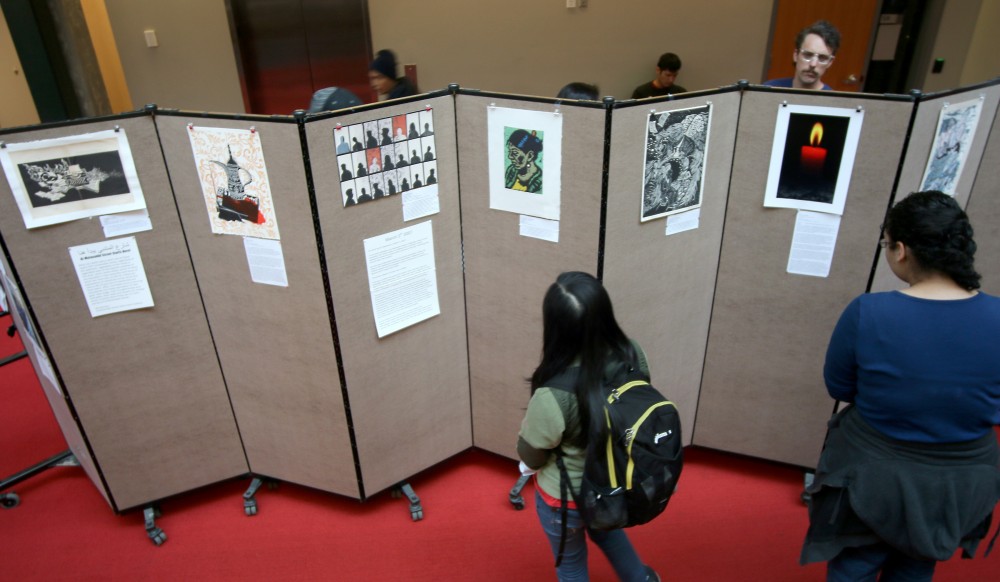 On March 5, 2007, a car bombing of Baghdad’s ancient booksellers’ street rattled the country and the world.
On March 5, 2007, a car bombing of Baghdad’s ancient booksellers’ street rattled the country and the world.
Since then, nearly 650 artists responded creatively to this attack on life and on freedom of expression. Through their creations, these artists, poets, writers and printmakers have expressed solidarity with the Iraqi people through their artwork. As a result of this grassroots response to the bombing, an international exhibition titled “Al-Mutanabbi Street Starts Here” was born.
This exhibit of more than 220 of the participating artists’ work is on display at four sites throughout Portland through early May. Part of the traveling exhibit is currently on show in PCC’s Library at the Sylvania Campus. Other locations include The Collins Gallery in the Multnomah Central Library, the Museum of Contemporary Craft, and Portland State University’s AB Gallery in the lobby of the Art + Design building.
“We wanted to create conversations and connections among us all about the meaning of this attack on culture and the exploration and expression of ideas,” said Bill Denham, a local printer and poet whose work appears in the exhibit. “The exhibit offers a template on how we might respond to this darkness by creatively making light.”
The art show’s visit to PCC is part of the college’s Internationalization Initiative. Its goal is to transform curriculum and the campus communities by advancing intercultural competence, sharing knowledge of peoples and cultures, and encouraging global learning.
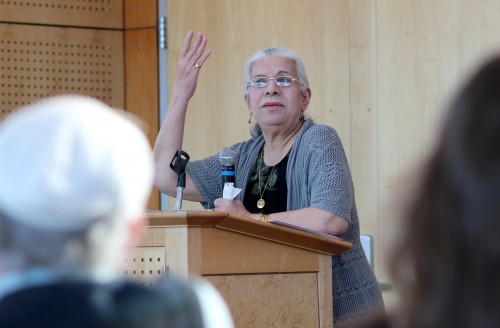
Aseel Nasir Dyck is writing a social history of Iraq, and translating her late father’s memoirs as an Iraqi educator, former cabinet minister, and ambassador.
The show’s run kicked off with an opening reception in the campus’ Performing Arts Center where guest speaker Aseel Nasir Dyck, discussed the shows’ impact and symbolism. In the audience were almost 40 students from Christine Weber’s Graphic Design class, who absorbed the international impact of the art exhibit.
Dyck, born in Baghdad, Iraq, is an activist and historian of Modern Middle East History. She has worked in university libraries in Lebanon, Iraq, Kuwait, Saudi Arabia, University of California at Berkeley, University of Texas at Austin, and at Portland State University. She is writing a social history of Iraq and translating her late father’s memoirs as an Iraqi educator, former cabinet minister, and ambassador.
“Al-Mutanabbi Street is named after the great 10th century classical Arabic poet Al-Mutanabbi,” Dyck said. “The bombing sought to destroy a cultural icon of Iraq. It was a street bustling with booksellers and bookbinders. It was a place to go to look for old books, out of print books and new books. I first went there at 13 years of age to collect stamps.
“This was a bomb in Iraq’s intellectual center,” she added. “It was not just a bomb that went off anywhere. It really affected people.”
Beau Beausoleil, a San Francisco bookseller and poet, corralled an alliance of artists, writers, printers, booksellers and readers in cities across America to generate a collection of artwork about the attack. An anthology was published soon after.
“I think all people in the world are under attack one way or another,” reflected Baher Butti, a psychiatrist, refugee advocate and founder of the Iraqi Society of Oregon, which is a sponsor of the art show. “As an Iraqi, we have been working publicly to make peace and justice whether locally or across the world.”


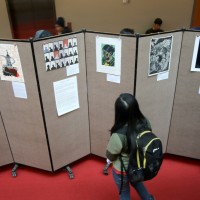
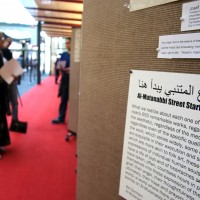
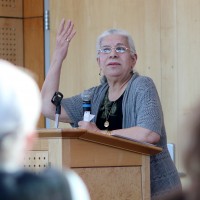
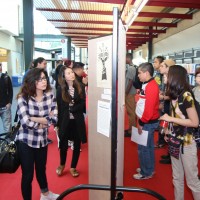
Words cannot express how honored I was to meet Ms. Dyck. She is an amazingly brilliant and courageous woman. I will continue, and sincerely look forward to following her work.